 11/07/2008 19:27 11/07/2008 19:27 |
|
| | | OFFLINE | | Post: 14.274 | Registrato il: 28/08/2005
| Utente Gold | |
|
    
* * * * * * * * * * * * * * * * * * * * * * * * * * * * * * * * * * * * * * * * * * * * * * * * * * * * * * * *
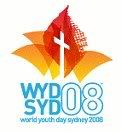  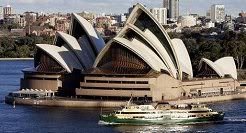 A few stories on WYD were posted earlier today in the preceding page. More from the Sydney Saturday papers (it is now Saturday, July 12, in Australia):
In the grip of Pope mania,
A few stories on WYD were posted earlier today in the preceding page. More from the Sydney Saturday papers (it is now Saturday, July 12, in Australia):
In the grip of Pope mania,
Olympic spirit returns to Sydney
By Angela Saurine and Kate Sikora


July 12, 2008
IN the grip of Pope mania, Sydney is alive with a spirit not seen since the 2000 Olympics.
As Pope Benedict XVI flies to Australia tomorrow, pilgrims from all over the world have descended on the city.
Taking day trips to beaches and overnight stays in regional areas, the world's Catholic youth are gearing up for the arrival of his Pontiff.
About 30 pilgrims from Mercedes College in Perth joined a group from the US for a mass in the Jenolan Caves, near Oberon yesterday.
"It was awesome," said Kathleen Glover, 18, from Tacoma, Washington.
"I have never done anything like that before. It was definitely a once-in-a-lifetime experience."
She was among thousands of WYD pilgrims staying in regional areas to meet local communities as part of the Days in the Dioceses program.
Nearly 2000 pilgrims from more than 20 countries, including Latvia, Brazil and the United Arab Emirates, stayed in the Wollongong area.
Another 300 from countries including Russia, France and Germany who were based in Wilcannia-Forbes took an excursion to Parkes to see the deep space radio telescope.
Road closures begin to take effect in Sydney today as the biggest event since the Sydney 2000 Olympics hits town.
Even though there are still three more days until WYD officially begins, the CBD has gone into lockdown with last-minute preparations.
Thousands of overseas and interstate pilgrims are arriving by plane and bus to stay at 400 parishes and schools.
About 10,000 pilgrims will camp at Sydney Olympic Park, earning it the nickname "Pilgrim Park".
But Monday is the "bumper day" when the most pilgrims will arrive and will be a true test of how public transport will cope.
Official events begin today, Ssaturday, including the pilgrimage to St Mary's Cathedral and Mary MacKillop Place in North Sydney - the location of the Australian saint-designate's shrine.
Catholic ministers join the queue
for the Papal Mass -
but it's a motley crew
By Linda Morris

July 12, 2008
THE Premier of New South Wales, Morris Iemma, who defied Cardinal George Pell by voting for stem cell research, wants to take Communion with Pope Benedict at the closing Mass for World Youth Day.
As a practising Catholic, he told the Herald he would be honoured to take Communion from the spiritual leader of his faith but "this was not an expectation".
The Deputy Premier, John Watkins, who is also a Catholic and the minister responsible for World Youth Day, but whose vote helped to overturn the ban on therapeutic cloning, said he would probably attend the closing Mass "in an operational capacity rather than as a guest".
"He has no expectation of celebrating Mass or taking Communion with the Pope but is expecting to attend several events in his capacity as Deputy Premier and minister responsible for World Youth Day," a spokesman said.
The Premier is among a core group of NSW Catholic ministers who will attend the closing Mass at Royal Randwick Racecourse, where the Pope will give Communion to a select group of 24 young confirmation candidates and their sponsors.
The VIPs will receive Communion from attending priests. Among those participating in the Mass will be the Minister for Ageing, Kristina Keneally, who met her husband at a previous World Youth Day, the Minister for Juvenile Justice, Barbara Perry and the Minister for Ports and Waterways, Joe Tripodi, who describes Catholicism as "one of the most significant factors in my upbringing".
The Minister for Community Services, Kevin Greene, will attend the closing Mass but will take Communion the day before at his local parish, Our Lady of Fatima, in Peakhurst.
Mr Watkins and Mr Iemma voted in favour of the stem cell bill despite Cardinal Pell's saying Catholic politicians who did so could expect consequences in terms of their place in the life of the church. Ms Keneally, Ms Perry and Mr Greene voted against it.
Mr Iemma said having the Pope in Sydney would be a "deeply rewarding experience for all Catholics, my family included".
* * * * * * * * * * * * * * * * * * * * * * * * * * * * * * * * * * * * * * * * * * * * * * * * * * * * * * * *
I am so happy to see an Op-Ed piece like this, of which there have not been enough from what I have seen so far of the Australian MSM coverage of WYD and the Pope's visit. The hyperbolic 'libertarian panic' about New South Wales's various laws governing citizen behavior during massive events has been deliberately overblown to misrepresent actual facts, and is totally uncalled for!
An excuse to bash
the Catholic Church
by Greg Craven

July 12, 2008
JUDGING by the fulminations in Sydney against World Youth Day, Benedict XVI may soon become the first Pontiff in living memory to paraphrase Mae West. "Is that bigotry in your pocket, or are you just not glad to see me?"
First, there were niggles about government money being invested to win Sydney the next biggest thing to a concert by the resurrected Beatles. Then there were piteous complaints that the neddies at Randwick would develop equine personality disorder by being moved for the papal Mass.
Now Sydney's flitterati are hysterical at provisions in state laws aimed at preventing annoyance and offence to pilgrims during the World Youth Day celebrations. Save us, the Catholics are coming!
The starting point here must be to concede that parts of the existing laws in question are problematic. Legal and human rights critics are right in arguing that terms such as "annoy" hardly convey the precision of meaning required when dealing with issues of freedom of movement and speech.
But some Catholophobe panic merchants have gone so far over the top that they are now in orbit around Jupiter.
What is worrying about these intemperates is not their criticism of the laws in question, which is overblown but within the bounds of public debate. It is their determination to paste the deficiencies of these laws on to Catholics and Catholicism itself that is deeply obnoxious.
In reality — which apparently does not matter much in this debate — there is nothing "Catholic" about these laws, for at least two reasons.
First, neither the Catholic Church nor the WYD organisers asked for the rigorous provisions in question.
This signals the second reason. The State Government drafted legislation in this way because, overall, it is the sort of legislation deployed to deal with massive, challenging events in Sydney, albeit in a highly unusual context. To government, the combination of big crowds and potential protest typically requires controlling laws.
Again, this does not make the legislation right or reasonable. Crowd control legislation typically is heavy-handed and overly broad. But this is as much a Catholic conspiracy as an Ian Paisley bucks night.
Like the iniquity of country music, most people would accept this. So why are there battalions of activists and civil libertarians so eager to cast the Catholic faith as a rights-abusing consortium?
The sad answer is that religious prejudice is alive and well in Australia. In the good old days, it was possible to attack Catholics as the fifth column of a pyre-lighting Pope. But along with overt anti-Semitism, this type of cheerful bigotry is no longer fashionable or legal.
So those with a problem with Catholics — or with religion in general — need to find more acceptable outlets for their hobby. Along with writing dull tomes on the joys of atheism and engaging in comic mockery of most religious and moral positions, putting the Catholic Church in the human rights dock is dead handy.
Indeed, Catholics — along with Evangelicals — always will be particular targets for the non-religious fundamentalist. Some other churches have made a separate peace with rampant secularism. Let us believe in God they say, and quietly worship, and we'll try not to bother you too much with that stuff about morality and resurrection.
But the Catholic Church stands adamantly in the way of proselytising materialism. Little wonder its denigrators are not too concerned with the truth around the World Youth Day regulations. If Paris was worth a Mass, Sydney is certainly worth a dissimulation.
Perhaps these self-appointed centurions of human rights also should reflect on just which rights are at risk here. Undoubtedly, people's rights to freedom of movement and expression are affected by the legislation, and to the extent it goes too far, this is a real and pressing issue.
But what about freedom of religion, one of the most basic of all rights? The legitimate right of protest and expression always will need to co-exist with the legitimate freedom of religion, and this means that protesters must respect the rights of World Youth Day pilgrims as much as the state must acknowledge the rights of protesters.
We need to be consistent here. How exactly would we feel about focused and hostile protests against Muslim or Jewish gatherings? Or against a prayer meeting led by the Dalai Lama? Or for that matter against the Mardi Gras and the men and women marching in it?
What was that about human rights?
Greg Craven is a leading constitutional lawyer and vice-chancellor of the Australian Catholic University.
Australian Jews
to meet Pope in Sydney

07/10/2008
Five Australian Jewish leaders will meet Pope Benedict XVI when he visits Sydney next week.
The meeting was announced amid continuing concerns about a planned re-enactment of the stations of the cross. Some 40 interfaith leaders -- including Muslims, Buddhists, Hindus and others -- will meet the Pope during his first Australian visit.
Benedict is traveling to Sydney for World Youth Day, a July 15-20 celebration that is expected to attract hundreds of thousands of Catholics to the Harbor City. An estimated 500,000 people are expected to attend the closing papal mass on July 20.
Jewish leaders are concerned about how Jews will be depicted in the July 18 re-enactment of the stations of the cross depicting the stages of Jesus' passion and death -- the same day they will meet the Pope at St. Mary’s Cathedral.
The Catholic Church has rejected requests by Jewish officials to cancel the third scene -- Christ’s condemnation by the Sanhedrin, the Jewish high court -- because they fear it could spark anti-Semitism.
[I did not follow other WYDs before this - I only followed Cologne virtually from the eve of Benedict's visit only - but was there similar fuss over the Stations of the Cross before? Catholics have been practising this devotion for centuries. It seems to me that lately, many Jewish groups have taken it upon themselves to reflexively register protest - or at least, concern - every time Catholics touch on the Jewish aspect of Jesus's life and of early Christianity. To state or portray that Jesus was tried by a Jewish ecclesiastical tribunal, the Sanhedrin, and that teh Jewish people of Jerusalem at the time chose to send Jesus to the Cross over a political rabble-rouser like Barabbas, is not to be anti-Semitic - it's merely being historical! Anti-Semitic is as anti-Semitic does. How could any Christian be anti-Semitic in word and deed these days without immediately being the object of opprobrium by everyone, including other Christians?]
A statement from the New South Wales Jewish Board of Deputies said although it expected the re-enactment “will be nothing like the recent Mel Gibson film,” referring to "The Passion of the Christ," they still have concerns.
“We have not seen the script, but the organizers have assured us that in the ongoing attention to the details of each station, every means is being undertaken to ensure that the production will be faithful to Nostra Aetate,” according to the statement.
The Jewish delegation is Robert Goot, the president of the Executive Council of Australian Jewry; Rabbi Jeremy Lawrence, the chief rabbi of the Great Synagogue; Rabbi Jeffrey Kamins, the chief minister of Temple Emanuel; David Knoll, the president of the New South Wales Jewish Board of Deputies; and Josie Lacey, the interfaith chair of the Board of Deputies.
World Youth Day, which was established by Pope John Paul II in Rome in 1986, has been held every two or three years in a different country.
[Modificato da TERESA BENEDETTA 12/07/2008 01:09] |
|
 11/07/2008 23:18 11/07/2008 23:18 |
|
| | | OFFLINE | | Post: 14.279 | Registrato il: 28/08/2005
| Utente Gold | |
|
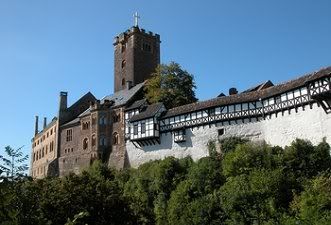 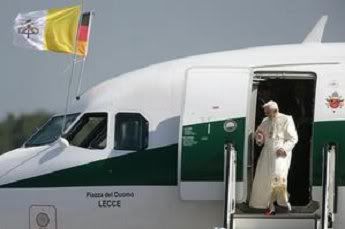 Is the Pope planning to visit
Is the Pope planning to visit
tHE cradle of Protestantism?
Posted by Tom Heneghan
FaithWorld blog

July 1, 2008
Is Pope Benedict planning a visit to a cradle of Protestantism? Should a Catholic Pontiff tour the medieval castle where Martin Luther translated the Bible into German at the start of the Reformation?
It’s far too early to get confirmations or denials from the Vatican or the German government, since the visit — still only in the rumor stage — is not due until the spring of 2009.
But a local newspaper in the eastern state of Thuringia, where the Wartburg is located, says security planning has already begun.


According to the Erfurt daily Thüringer Allgemeine, an advance team from the German president’s office in Berlin has already met local police. Dieter Althaus, the state premier who invited Benedict to Thuringia during a visit in Rome in April, has also met mayors from towns in the area “to discuss the emergency case of a papal visit.
Also in Eisenach, the words ‘Pope’ and ‘Wartburg’ are mentioned together more frequently.” An earlier German press report about a possible trip mentioned that Benedict would visit Eichsfeld, a nearby island of Catholicism in an otherwise Lutheran region, so he would be in the neighborhood.
Apart from the security, a visit by any Pope to the Wartburg would need careful preparation to ensure it helps rather than hurts Catholic-Protestant relations.
If that Pope is Joseph Ratzinger, the task becomes even more tricky. Pope Benedict has studied the writings of Martin Luther — he’s probably the only Pontiff who ever has — and impressed Lutherans with his knowledge and appreciation of his fellow German theologian.
At the same time, he has also been blunt in describing Protestant denominations as “not proper churches.” In fact, he doesn’t refer to them as churches at all, but “ecclesial communities.” [I believe these statements are inaccurate. The CDF has made the distinction - but not, I think, Pope Benedict personally - that some Christian denominations which broke off from the Church during the EEformation cannot be considered as 'Churches' in the strict Catholic definition that sees the Roman Catholic Church as the 'only Church of Christ'. But Catholic hierarchy, including Pope Benedict, have continued to use the term 'church' in everyday speech for the Reformed Protestant churches. I made a point to notice how the Pope would refer to them in his JuNE 28-29 homily and address.]
Not surprisingly, Protestant leaders feel offended. [Only the thin-skinned. The more sensible simply considered it as the Roman Catholic Church asserting its conviction.]
Do you think a papal visit to the Wartburg would help or hurt ecumenical relations?
I checked the Thuringian newspaper online, and in its July 10 issue, it carried at least 3 articles about the expected papal visit - two of them reporting rumors and indications, but the third one headlined 'Everything points to a visit by the Pope to Eichsfeld', citing the facts marshalled by Heneghan in his blog above.
This prospect is even more interesting if, as earlier speculated, Luther will indeed be the subject for the Ratzinger Schuelerkreis's annual September reunion this year to be held in Castel Gandolfo.

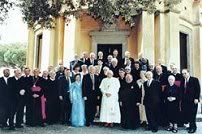 
Heneghan's item led me to realize that I failed to post a TIME article on July 9 about the crisis int he Anglican Communion and what role Pope Benedict XVI migth have in 'resolving' it - I believe the word 'aid' in the article's title was deliberately intended to be ambiguous!
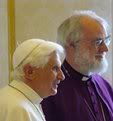 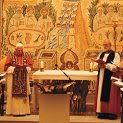 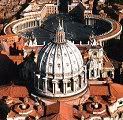 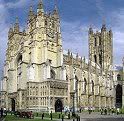 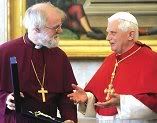 Could the Pope aid an Anglican split?
Could the Pope aid an Anglican split?
By David Van Biema / New York
and Jeff Israely / Rome

July 9, 2008
The scene on Monday at the Synod of the Church of England was wild. The Archbishop of Canterbury cradled his head in his hands; his presumptive successor, the Archbishop of York, appeared to be tearing at his head; and a lower-ranking prelate was reduced to public tears.
The cause of this drama was a series of votes, over the vehement objections of traditionalists, allowing the church to name female bishops. To rub it in further, the Synod of the Church of England slapped down a counterproposal that would have allowed conservative parishes to avoid answering to female bishops and submit to an independent authority of special (that is, male) "superbishops" instead.
Faced with this crushing denial, a sizable chunk of traditionalist priests and bishops could well leave their church. On Wednesday, one bishop announced his intent to take his flock with him.
Does this sound familiar? A non-English spectator might be tempted to think that the agony was another chapter in the battle between theological conservatives and liberals that currently threatens the unity of both the global Anglican Communion and the U.S. Episcopal Church. (The Church of England is the flagship of the Communion and the Episcopal Church is a member.)
In fact, on its face, the Church of England's crisis is only distantly related to the global or American scene. However, it might draw in a very powerful observer from outside the Communion who could make things very interesting: Pope Benedict XVI.
Both the special nature of the English crisis and the Pope's possible involvement hinge on the fact that most of the English dissidents this week are not the evangelical, Bible-thumping members of the Communion whose fury at the American ordination of an openly gay bishop has led to talks of schism this summer.
Rather they are members of a faction, heavy on liturgy and ritual, that abhors evangelicalism but considers itself very close to the Catholicism from which the Anglican Church originally sprang.
Many "Anglo-Catholics" share Rome's opposition to female ordination.
They have also historically hoped for a reunion with Catholicism, and correctly assume that female bishops would be a deal-breaker in any negotiation with Rome. So the move to ordain women bishops is more than some of them can stand.
In a petition last week, some 1,300 Anglican priests and bishops stated that if the Synod voted along the lines that it eventually did on Monday, that "we will inevitably be asking whether we can... continue [with] the Church of England which has been our home."
Would they actually leave? This is where the Pope comes in. For an ordained clergyman to depart his cradle faith is a lonely endeavor, done individually. But that is probably not how things will roll out in this case.
A Catholic Church official explained to TIME that the last time a situation like this arose (when the Church of England voted to allow women to become priests), "some 400 [dissidents] became Catholic priests or bishops."
The issue, he says, is "whether there is some way for [the current crop] to come into the Catholic Church in a corporate way, [with] their [congregations]."
Along those lines, he notes, there are so-called "Anglican Rite" groups in the U.S. that maintain Anglican ritual, but recognize the Pope's authority and count as Catholics.
In fact, in a letter to the newspaper The Catholic Herald on Wednesday, the Rt. Rev. Andrew Burnham, Bishop of Eversfleet, announced his intention of converting to Catholicism — along with his diocese.
According to the Herald, Burnham and another traditionalist Bishop have been discussing the migration of Anglo-Catholics with Cardinals William Levada and Walter Kasper, two of the Vatican's most powerful prelates.
Burnham's letter requests "magnanimous gestures by our Catholic friends, especially the Holy Father, who well understands our longing for unity." According to the Herald, Burnham has been requesting a dispensation whereby Anglicans could remain in their parishes guided by Catholic bishops.
Terry Mattingly, for years an acute observer of the Anglican scene as founder of the popular religion blog Getreligion.org, and a religion columnist for Scripps Howard says, "I expect some of the old-school Anglo-Catholics to pack up and go to Rome, period."
But if Benedict were to sweeten the pot by allowing an Anglican Rite Church in England, "that's gotta be huge." And when Mattingly says "huge," he doesn't just mean for the Anglo-Catholics.
Rather, he believes that an exodus of that size could affect the worldwide Communion after all, by giving other dissidents, with entirely different grievances, a model with which to unravel the fabric of Anglicanism.
Mattingly points out that more so than in other religious groupings, one of the things that holds the Anglican Communion together is the simple belief that the Anglican Communion must hold together. The case can be made that a dutiful sense of global unity, represented by four "instruments" — including the Archbishop of Canterbury Rowan Williams — is stronger than any Anglican doctrinal agreement.
Mattingly suggests that the departure of 1,300 priests and bishops from the English mother church could act as a kind of spell-breaking moment, the first time during the Communion's current round of troubles when a significant number of Anglicans "are saying, 'I'm no longer in communion with Canterbury.'"
Such a defection, as it played out in terms of theology, finances and British law, would be a kind of seminar for all possible schismatics on how to break with the Communion, without the world ending. Other dissidents might then feel freer to go their own way.
And it could happen a good deal sooner than almost any other version of schism, primarily because it would take the key decision out of the hands of the Anglicans, who, as Mattingly puts it, "have a special knack for not making decisions."
Rome, he notes, "doesn't usually act fast, either. But Rome — and especially, it seems to me, Benedict — has a knack for acting with clarity more than Anglicanism."
Mattingly's argument — which he would admit is only a possibility, not a prediction — may underestimate Anglican desire to stay Anglicans; or overestimate the willingness of the Roman Catholic Pope to play spoiler in the disintegration of another centuries-old international Christian body, even if he has his differences with it.
But in this sour Anglican year, it is difficult to guarantee that the head-cradling, hair-pulling and weeping of the mother church might not become a worldwide epidemic.
[Modificato da TERESA BENEDETTA 12/07/2008 00:29] |
 12/07/2008 01:17 12/07/2008 01:17 |
|
| | | OFFLINE | Post: 3.168 | Registrato il: 23/11/2005
| Utente Master | |
|
The king of God's country
Sydney Morning Herald
July 12, 2008
Joseph Ratzinger has surprised many since becoming Benedict XVI three years ago, writes Barney Zwartz on the eve of the Pope's arrival.
World Youth Day in Cologne three years ago was perhaps the defining experience of Liz Hamilton's life to date. The then 20-year-old Melburnian went to see the newly elected Pope Benedict and was not disappointed.
"About 800,000 people came; there were people everywhere. It was so festive, celebratory, people were singing and laughing, swapping cultural tokens like badges, hats and T-shirts," she says
Given the media's depiction, she expected Benedict to be stern, even hard, but found him surprisingly warm. "I thought he was a beautiful man with a real gentleness and humanness, so thoughtful. He spoke in five languages, and when he spoke in English I just cried - it was really moving."
Having the Pope celebrate Mass was a thrill she is determined to repeat in Sydney, where Benedict arrives tomorrow. "I'm looking forward hugely to seeing him again, even if he is just a speck on a stage," she says.
When Joseph Ratzinger was elected the 265th Pope on April 19, 2005, and took the name Benedict, there were many in the church who thought he would be just a speck on the stage. They expected a pale shadow of John Paul II, mimicking his policies and priorities but without the charisma or charm. Nicknamed "God's rottweiler", "the Panzerkardinal" and an ecclesiastical "Darth Vader", Ratzinger was seen as the church's mailed fist.
But Benedict XVI has been more velvet glove, and very much his own man. There have been continuities, but in many ways he has been a stark contrast - more self-effacing, gentle and intellectual - to the previous Pope, for whom he was chief adviser and doctrinal watchdog.
There have been no heresy hunts, few confrontations, a much less visible presence and much less travel. His writings, including encyclicals on love and hope, have been optimistic. A profound and subtle theologian, he has sought to engage and to persuade, inside and outside the church.
"He's an outstanding public teacher, and the educated world is listening," says Sydney's Archbishop, Cardinal George Pell, a former close colleague at the Congregation for the Doctrine of the Faith. "One interesting fact, almost counterintuitive, is that more people are coming to hear him on his Wednesday audience and on Sunday than came to hear John Paul II."
Pell says what has surprised the watching world is how affable, serene and successful Benedict has been as a public personality. "As Pope, one's entitled once in a while to be angst ridden, but he's remarkably serene." (That serenity might be a little ruffled as news of this week's sexual abuse controversy involving Cardinal Pell reached Rome.)
Sydney's Anglican Archbishop, Peter Jensen, also is impressed. "He's a very different leader from his predecessor but, from a Roman Catholic point of view, he's an excellent successor. He's clearly not just an interim, as some thought because of his age [at 78, he was the oldest man elected Pope in 275 years]. I recently read his work on hope. It was beautiful, it was eloquent, it was effective," Jensen says.
Paul Collins, the Australian former priest who ran foul of Ratzinger at the Congregation for the Doctrine of the Faith, says this is a much lower-key and more traditional papacy. "He doesn't see himself as the king of the universe, and that's a relief from his predecessor, who had almost messianic pretensions," he says.
Describing Benedict as God's rottweiler was grossly unfair when he was at the congregation, and is even more unfair now, Collins says. "Benedict is a gentle man. He sees himself quite correctly as a father figure in the church and is not punitive."
Highlighting the difference in the approach of the cat-loving, Mozart piano-playing pontiff is Benedict's treatment of the progressive theologian Hans Kung, a former colleague at Tubingen University. In 1979 the Vatican stripped Kung of his licence to teach as a Catholic theologian after he challenged the doctrine of papal infallibility. For 26 years, Kung wrote repeatedly to John Paul II seeking a meeting, and never received a reply. When Benedict got the same request, he quickly met Kung in a friendly four-hour discussion.
"Pope Wojtyla [John Paul II] wanted to be the big high priest and reduced the bishops to film extras who have nothing to say but who have just to applaud," Kung told the British Catholic magazine, The Tablet, last month. "Benedict XVI would tell you he talks to the bishops all the time. He's very attentive. He doesn't bang the table like Pope Wojtyla and say, 'I don't want to hear about the lack of vocations.' But he is different in tone, not substance."
In his memoirs, Kung wrote: "What you have to remember about Joseph Ratzinger is that he was brought up in a police station."
Benedict was born on April 16, 1927, in a Bavarian village, where his father was a police officer whose devout Catholicism made him strongly anti-Nazi. At 14, like all German boys, he was signed on to the Hitler Youth movement and, at 16, he was sent to an anti-aircraft unit. After the war, he spent a few months in a prisoner-of-war camp, then entered the seminary and was ordained in 1951, the same day as his only brother.
He spent the next 26 years as an academic and theologian, and played an important role as an adviser to Cologne's Cardinal Josef Frings at the reforming Vatican II council in the 1960s. Benedict was regarded as a reformer, but he gradually identified less with the progressives, especially after the student riots that swept Europe in 1968. He became Archbishop of Munich in 1977, and John Paul II brought him to the Vatican to head the Congregation for the Doctrine of Faith in 1981. He tried three times to retire before becoming Pope.
On his election, Benedict identified halting the collapse of the faith in Europe as his top priority: challenging the "dictatorship of relativism", as he put it in a famous sermon on secularism and rationalism. His chief weapons have been intellectual and theological, particularly his two encyclicals on love and hope.
Neil Ormerod, a professor of theology at the Australian Catholic University, says the works show consummate scholarship and take a remarkably optimistic view of humanity, which is why people have responded so well. "What has surprised is what he isn't saying. The dark shadow of Augustinian pessimism that seemed to be part of his approach at the CDF has been replaced by a greater openness," he says.
"There's a luminous aspect to what he's presenting, which is not just to a Christian readership but to the world. He's trying to reach out to everyone and attract them to the Christian message. It's not just theological, it's evangelical in that sense."
The widening fault-line with Islam also needed attention, and here Benedict has been firmer than John Paul II, arguing for reciprocity - that if the Saudis can build a mosque in Rome, they should allow a church in Saudi Arabia.
But Greg Barton, a professor of religion and society at Monash University, says Benedict has made some faux pas, particularly the 2006 speech at the University of Regensburg, quoting a 14th century Byzantine emperor's criticism of Islam, which sparked a furious and violent response in parts of the Muslim world.
"I'm told he relied a lot for his insight into Islam on Lebanese Christians, who didn't necessarily serve him well for a more enlightened engagement," Barton says. "The fact that he called in Islamic leaders after the Regensburg debacle and opened up lines of communication suggests he recognised he needs to work on these facets. But he has a long way to go in understanding the issues."
A Vatican watcher, Sam Gregg, disagrees, suggesting the Regensburg address was the key to understanding Benedict's approach to both secularism and Islam. Gregg - the director of research for an American think tank, the Acton Institute - says the speech was not aimed at Muslims. "It's actually primarily directed at Europe, and the crisis of faith and reason which Benedict believes is at the intellectual core of the attempt to abolish religion from public life."
After that speech, Gregg says, European secular thinkers started taking Benedict seriously. "I'm pleasantly surprised by the degree to which many people, including non-Christians, pay attention to what he has to say. It doesn't mean they are becoming Christian, but that they are engaging in the question with a new seriousness."
Others are disappointed by this Pope. Bill Uren, a Melbourne Jesuit, winces at the mention of secularism and relativism. "You need to pick these labels apart and find out what's good and not so good. He tends to confront the modern world, rather than engage with it."
But Uren appreciates the encyclicals - "homiletic, moderate and very welcome" - and Benedict's softening of a "witch-hunt mentality". He also notes that if Benedict has failed the test of progressiveness, he has not been as regressive as some feared.
"He's much more a churchman than John Paul II was. He knows the ropes of the church and, rather than issuing thunderbolts, he prefers to work the system," Uren says.
But he has not reformed the Vatican bureaucracy, he says, and no church doctrine has been moderated.
"There were whispers about admitting divorced Catholics to Communion, but nothing has happened. The ecumenical movement has to some degree withered on the vine. There's been a reversion to some of the pomp and ceremony, the vestments and liturgy."
Juliette Hughes, a leading Australian laywoman, says Benedict has done nothing to stop the exodus from church thanks to its strictures on gender, the body and family life. "For women in particular, who are well over half the congregations, our lack of position in decision-making about matters that intimately affect our own lives is ludicrous."
Hughes says most Catholics she knows do not respect the church's official teaching. "They long, as I do, for some sanity to prevail with condoms against AIDS in Africa, the use of contraception full stop, with people who want to end marriages, with women joining the priesthood," she says.
"Their response has been to gag the messenger. They think they are in damage control and don't realise they are the damage."
Collins welcomed Benedict's election three years ago, saying only a conservative Pope could bring reform. But he now believes Benedict is not the one. "He's a very good theologian, and he understands the nature of pluralism, which John Paul didn't. But tackling basic questions, such as the shortage of priests or women in the church, these questions that can't be sidestepped aren't even on the agenda, and won't be during this papacy."
Rome, Collins says, still micromanages "absolutely everything". That "everything" includes World Youth Day, which means - as the politician and former seminarian Tony Abbott pointed out recently - Benedict is more likely to be seen in Australia than heard. He will not be giving press conferences, and is unlikely to explain why he told Italian priests that Australia is one of the most irreligious countries in the West.
Long path to the papacy
BORN Joseph Alois Ratzinger on April 16, 1927, in Marktl am Inn, Bavaria, southern Germany, he was the third and youngest child of a policeman.
After his 14th birthday in 1941, he was enrolled by the principal of his boarding school in the Hitler Youth - as required of all 14-year-old German boys - but never attended a meeting.
At 16, he was drafted into the anti-aircraft corps, later training in the infantry, but saw little war action, deserting back to the family home ahead of the Allied advance. He spent a few months in a POW camp, was released at war's end and, with his brother Georg, entered St Michael Seminary in Traunstein. The two were ordained on June 29, 1951.
In 1959, Joseph was made a lecturer at the University of Bonn, beginning a long career as an academic theologian.
In the Second Vatican Council, when he was seen as a reformer, he served as theological consultant to a German cardinal, and in 1966 took the chair in dogmatic theology at Tubingen University, where he penned Introduction To Christianity and wrote that the papal duty was to consider voices of dissent. The church, he said, was too centralised and rule-bound.
In 1977, he became archbishop of Munich and Freising, and in 1981 the Prefect of the Congregation for the Doctrine of the Faith, formerly known as the Holy Office, the doctrinal watchdog. By 2000, he was dean of the College of Cardinals, and on April 19, 2005, was elected John Paul II's successor as Pope. He took the name Benedict XVI. He has said the papal role is more like that of a constitutional monarch, rather than an absolute monarch.
|
 12/07/2008 01:25 12/07/2008 01:25 |
|
| | | OFFLINE | Post: 3.169 | Registrato il: 23/11/2005
| Utente Master | |
|
Pope gets pointy end of plane all to himself
Paola Totaro
The Age
July 12, 2008
Alitalia is flying the Pope, his team and the media in order of importance.
WHEN Cardinal Joseph Ratzinger stepped on to the balcony of St Peter's for the first time as Pope Benedict, he described himself to the faithful as a "humble toiler in the vineyard of Our Lord".
Three years have passed and this humble worker, now 81 and affectionately known in Italy as "B16", has clocked up enough frequent flyer points to shame a campaigning US politician.
Pope Benedict leaves Rome for Sydney this morning aboard an Alitalia Boeing B777 jet. "However, the first-class cabin will appear very, very different," said a Vatican observer. There will be "at least two, big comfortable armchairs - not like airline seats at all - a bed for His Holiness, work tables, baskets of flowers and a kneeler and crucifix for in-flight prayer."
The first Pope to reach his flock by aircraft was Pope Paul in 1964 (to the Holy Land on a DC8). Since then, Popes have always flown out of Rome with Italy's national carrier, Alitalia - and always using the same call sign, AZ4000 - while the host country's national carrier (in Australia's case, Qantas) traditionally returns him to the Vatican.
While the first-class cabin is set aside for the pontiff, business class is accommodating the 27-person entourage accompanying him to Sydney. It includes a cardinal, an archbishop, two bishops and several priests.
Heading the delegation is the Vatican's secretary of state, Cardinal Tarcisio Bertone, a member of the powerful Congregation for the Doctrine of the Faith. He is one of the Pope's closest confidants. The bishops include Archbishop Fernando Filoni, who is a field diplomat and expert on China and the Middle East. Monsignor Filoni was sent to Baghdad in 2001 and came close to being killed when a car bomb exploded near his vehicles. He served in Iran and Jordan and was Apostolic Nuncio to the Philippines until he returned to the Vatican in June last year.
Also on board is Monsignor Georg Ganswein, the Pope's handsome private secretary. A skiier, avid tennis player and an apparently interesting dinner party guest, Monsignor Ganswein was once dubbed "Bel Giorgio" ("Gorgeous George") by Italian newspapers.
The Pope's master of ceremonies, Monsignor Guido Marini, is coming to ensure that all functions run smoothly. He will remain at the pontiff's side during all Masses and liturgical celebrations.
Another fellow in business class will be lay official Alberto Gasbarri who runs the office of protocol at the Vatican Secretariat. He's in the business end of the Vatican, working with organisers in host countries like Australia to co-ordinate security, check venues, liaise over transport and routes.
The Pope's security team is headed by Domenico Giani, inspector-general of the Vatican's Gendarmerie, or police. He flies with four of his officers and four officials of the Swiss Guard.
Then there are the Vatican spin doctors: the director of the Holy See's press office, Padre Federico Lombardi, a quiet Jesuit. There's also the editor of the Roman Observer (Osservatore Romano), Professor Giovanni Maria Vian, who travels with a photographer and writer. Two Vatican radio and TV staff will also be in tow.
Last but not least in business class is the Pope's doctor, Renato Buzzonetti, assisted by a doctor from the Vatican's health and hygiene department. Dr Buzzonetti, 80, attended Pope John Paul for more than a decade.
In economy class come the press, including those from the Vatican's media office, specialist Vatican reporters, and members of the host country's media.
Five Australian journalists are in the 44-strong, non-Vatican group, including one from The Age. Among the contingent are representatives from The New York Times, Agence France Press, AP and Reuters, Italian papers including Corriere Della Sera, the American Broadcasting Company, Spain's El Pais newspaper, France's Le Figaro and nearly all the big Catholic news organisations.
|
 12/07/2008 01:39 12/07/2008 01:39 |
|
| | | OFFLINE | | Post: 14.280 | Registrato il: 28/08/2005
| Utente Gold | |
|
'Kind' and 'reliable' Jesuit
named to #2 Vatican doctrinal post
All Things Catholic
by John L. Allen, Jr.

Friday, July 11, 2008
Last week brought a Vatican appointment that didn't exactly cut in the direction of what I call "affirmative orthodoxy," meaning Pope Benedict XVI's strong defense of the faith coupled with a gentle, positive style. Archbishop Raymond Burke, named as prefect of the Apostolic Signatura, instead has a profile as something of a cultural warrior.
This week Benedict XVI returned to form, with a nomination to a post arguably more consequential than Burke's. On Wednesday, the Pope named Jesuit Fr. Luis Ladaria, a Spaniard, as secretary of the Congregation for the Doctrine of the Faith.
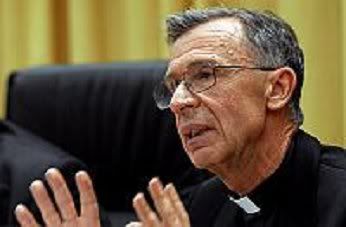
By all accounts, they don't come much more "affirmative orthodoxy" than Ladaria.
The vacancy was created when, on the same day, Benedict appointed Archbishop Angelo Amato, secretary of the CDF since December 2002, as the new prefect of the Congregation for Saints. The move puts Amato, 70, in line to become a cardinal, a typical Vatican way of rewarding loyal service.
Given that the result has long been taken for granted, the more interesting question was always whom Benedict would tap as Amato's successor. In many ways, serving as secretary of the CDF -- traditionally known as La Suprema, or the "supreme" congregation -- is one of the most important jobs in the Vatican, especially under a Pope who cares passionately about the theological underpinnings of policy choices.
A Jesuit, Ladaria was born in 1944 in Manacor, Spain, part of the Balearic Islands off the east coast of the Iberian Peninsula. He took a law degree at the University of Madrid in 1966, then a theology degree at the Jesuit-run Sankt Georgen Graduate School of Philosophy and Theology in Frankfurt. He earned a doctorate in theology at the Gregorian University in Rome, also run by the Jesuits, with a dissertation on "The Holy Spirit in St. Hillary of Poitiers."
That background may have recommended Ladaria to Benedict XVI, very much a man of ressourcement, or a return to the sources of the church, especially the Fathers. Ladaria's interest in Christology may also be part of the picture, given that Christology has been a key doctrinal interest both of the CDF and of Benedict personally in recent years.
Ladaria taught the history of dogma at the Pontifical University of Comillas in Spain until his appointment to the Gregorian University in Rome, or the Greg, in 1984. There he put in a stretch as vice-rector from 1986 to 1992. His curriculum vitae includes 20 books and 83 academic articles.
His current book project is El Dios vivo y verdadero: el Misterio de la Trinidad (The Living and True God: The Mystery of the Trinity).
Ladaria served as a member of the International Theological Commission, the main advisory body to the CDF, from 1992 to 1997, and became a consultor for the congregation in 1995. In March 2004, he was named general secretary of the ITC.
As rumors of the appointment began to circulate early this week, I reached out to Ladaria's colleagues at the Gregorian and on the ITC for a "read" on who he is, and what one might expect from him at the CDF.
It's telling that the two most common terms Italians used to characterize him were gentile, meaning "kind," and affidabile, meaning "reliable" -- both in the generic sense that he's a responsible, hard-working person, and in the more narrow ecclesiastical sense that he's strongly committed to church teaching. As I listened, it struck me that affidabilità gentile could serve as a rough Italian equivalent of "affirmative orthodoxy."
Here's a sampling of what I heard about Ladaria from various sources, some of them fellow Jesuits, some fellow theologians, and some Vatican personnel who've had dealings with Ladaria. The comments span the spectrum of theological positions, cultures, and languages:
"He teaches Trinity in the first cycle, and he's probably the most popular theology professor at the Greg. I would attribute that to his very lively and clear lecture style, his language skills, and his cordial behavior toward students, including those whose research he directs. The more 'classical' first-cyclers (American and French seminarians especially) also delight in Luis' clear orthodoxy … He'll be a great loss."
* * *
"Luis is a good man, learned and responsible … He is a popular and well respected teacher/lecturer at the Greg. He is also a genial and understanding member of our Jesuit community … Theologically, I would describe him as a 'moderate conservative'. He is not tied to any particular theologian."
* * *
I know him quite well and I have great respect for him. He is a top shelf theologian, extremely hard working, and a very popular lecturer at the Greg. His optional courses draw as many as 150 students, and he directs a huge amount of theses. He is also very human. He laughs a lot, and is very gracious with the women who clean our offices etc."
* * *
[Ladaria] was sent by his Spanish Jesuit province for basic level theology to Sankt Georgen in Frankfurt, where he learned the basics very well, studied the thought of the 20th century classics, and was steered to prepare for teaching systematic theology by deep study of a church Father. (He was influenced by H.J. Sieben, THE scholar of church councils).
He did his doctorate at the Greg under Antonio Orbe (a world specialist on gnosticism and Irenaeus) on Hillary of Potiers (attracted by his Christology, perhaps). … By the early '80s he was full time at the Gregorian and gradually became a highly respected teacher and productive theologian. He turned out books in the areas he taught, more recently on Trinitarian theology, to which he shifted in the '90s. He was known for lucid presentations of complex theological topics and issues. Right now he's the best theological mind at the Greg and will be hard to replace.
… We used to think of him as a bit fragile, but he's developed an overall strength for multitasking, being on every important committee at the Greg, consulting for the CDF, joining the ITC, all while teaching and writing. His work as secretary of the ITC was going well in handling meetings and the work coming in from members on their different projects, which was his testing for the new job. He's good in the languages -- Spanish, English, French, German and Italian. Theologically he's centrist, I would say. Reserved, but in personal exchanges quite ready with grounded critiques of both positions taken at the left and right.
* * *
He's a very sensible, fair kind of man and always approachable: a 'can-do' character. He chaired most of the ITC meetings. He never intruded his own theological views on any discussion -- in fact, I am not entirely sure what he thinks. All in all, I would be more uplifted than downcast by his appointment to the CDF. Indeed, I hope that the ITC does not lose his good offices.
* * *
Ladaria was a great worker for Ratzinger for years, as a consultor at the CDF from the 1990s. He's a patristic scholar, a world-level expert on Hilary of Poitiers. At the Greg he taught various courses in systematic theology, for example on the Trinity. Both he and Amato were opposed to the book of Dupuis, but Ladaria is superior to Amato as a theologian.
(Note: the reference in the last comment is to the late Belgian Jesuit Fr. Jacques Dupuis, whose book Toward a Christian Theology of Religious Pluralism drew a critical notification from the Vatican in 2001.)
It was impossible to find anyone who doesn't seem fond of Ladaria on a personal level -- for his work ethic, his scholarly achievement, and his warm disposition. Most say that Ladaria is robustly orthodox, open, and prepared to extend the benefit of the doubt to views with which he disagrees.
One difference between Amato and Ladaria may be that Amato taught at the Pontifical Salesian University, while Ladaria was at the Greg, where he likely would have been exposed to a wider range of theological outlooks.
Three conclusions seem to follow.
One, in some ways what we are seeing under Benedict XVI is a return to the old days when the Pope himself ran the Holy Office. Until 1968, in fact, the Pope was formally the prefect of the Vatican's doctrinal office, appointing a cardinal to serve as secretary (later the title became "pro-prefect"). Benedict XVI has staffed the CDF with people who were close to him while he served as prefect, ensuring broad continuity with the direction he set.
Two, Benedict XVI's litmus test for key appointments is not simply orthodoxy, but also content-area competence. Burke, for example, was named to head the Apostolic Signatura not primarily because of his tough stand on communion for pro-choice politicians, but because he's known as one of the best canonical minds at the senior level of the church.
Ladaria likewise is known as an accomplished theologian who also is able to coordinate the work of other scholars effectively.
Three, the most sensitive jobs in the Holy See under Benedict XVI are generally going to "affirmative orthodoxy" personalities. In the end, I suspect this will be remembered as a defining feature of Benedict's papacy -- his intriguing way of blending the bitter with the sweet, of combining doctrinal clarity with personal dolcezza.
* * *
Finally, three quick reflections on the significance of naming a Jesuit as secretary of the CDF.
First, one can't help but see the appointment as another sign of reconciliation between the papacy and the Jesuits. Benedict XVI now has two Jesuits in his inner circle: Ladaria and Fr. Federico Lombardi, the Vatican spokesperson. The Pope may not have intended the appointment to have broader significance -- after all, he appointed Ladaria to the job, not his entire religious community.
Nonetheless, given the well-known tensions between the Jesuits and John Paul II, the choice of Ladaria will be seen as a vote of confidence. That's an especially tempting interpretation in light of the warm reception Benedict XVI gave the Jesuits at the end of their General Congregation back in February, when the Pope told the order: "The church needs you, it counts on you, and it continues to trust you, especially your ability to reach those physical and spiritual places where others can't go."
Reacting to the Ladaria appointment, Fr. Adolfo Nicolás, Superior General of the Jesuits, issued a statement saying, "We accompany Fr. Ladaria with our prayers and our support. We hope and pray that he may help to build ways of dialogue in the service of the faith."
Second, while such expressions of gratitude and support from the Jesuits are no doubt sincere, they cannot completely mask a degree of ambivalence about seeing one of their own assume an administrative position in the Congregation for the Doctrine of the Faith, the historical successor to the Supreme Sacred Congregation of the Roman and Universal Inquisition. As is well known, St. Ignatius of Loyola, the founder of the Jesuits, was twice imprisoned by the Spanish Inquisition and questioned about his beliefs.
While everyone recognizes that today's CDF is a far cry from the Spanish Inquisition (which, incidentally, was distinct from the Inquisition in Rome), nonetheless some Jesuits may feel a nagging sense that Ladaria's appointment is not exactly what Ignatius had in mind. One put it to me this way: "Ladaria is a great guy, and I would be thrilled with his appointment to the CDF -- if he weren't a Jesuit."
Third, this is the second time in a decade that the Vatican has deprived the Gregorian of a popular teacher and a workhorse faculty member. The first came in the late 1990s with the investigation of Dupuis, which effectively ended his teaching career.
Now Ladaria has been scooped up, though obviously on a much more positive note. The Greg is already struggling to attract young Jesuit scholars, many of whom prefer to teach at places such as Louvain or Georgetown, or even at secular institutions such as Harvard or the Sorbonne.
In his statement on the Ladaria appointment, Nicolás indirectly alluded to this difficulty: "On the part of the society, I am confident that once again the generosity of the provinces will provide theology professors of competence and spiritual quality to continue the work of Fr. Ladaria at the Gregorian University," he said.
The Gregorian, as is well known, is where a broad swath of future leaders in the church are trained, including a disproportionate share of bishops. For the sake of both the society and the church, one hopes that Jesuits around the world respond affirmatively to Nicolás's call.
* * * * * * * * * * * * * * * * * * * * * * * * * * * * * * * * * * * * * * * * * * * * * * * * * * * * * * * *
Kudos to John Allen for such a quick but rather thorough backgrounding of Fr. Ladaria. Even without this, of course, there could not have been any doubt that Joseph Ratzinger's personal familiarity with the person and thinking of Fr. Ladaria from years of working together at the CDF and ITC obviously earned the latter his high esteem.
|
 12/07/2008 13:18 12/07/2008 13:18 |
|
| | | OFFLINE | | Post: 14.290 | Registrato il: 28/08/2005
| Utente Gold | |
|
   For the latest videonews on the Holy Father
www.radiovaticana.org/it1/videonews_ita.asp
BON VOYAGE, YOUR HOLINESS!
For the latest videonews on the Holy Father
www.radiovaticana.org/it1/videonews_ita.asp
BON VOYAGE, YOUR HOLINESS!
The Pope arrives at Fiumicino airport by helicopter from Castel Gandolfo.
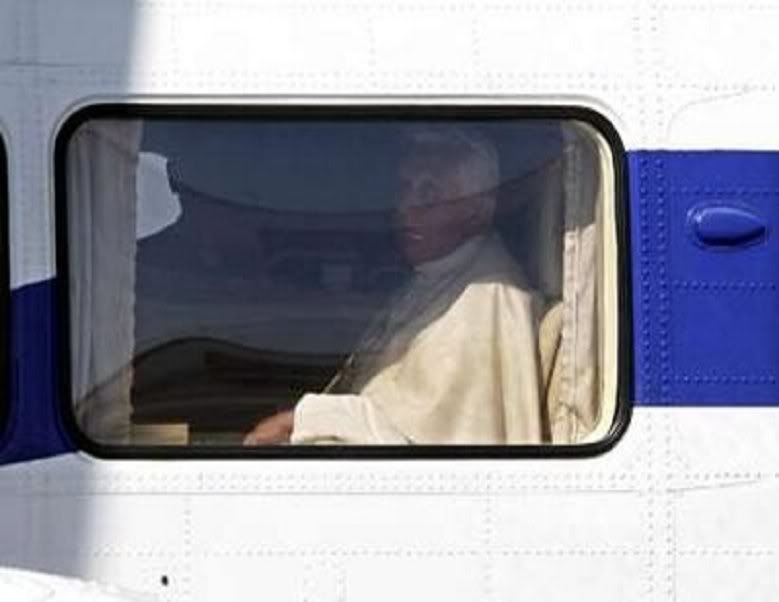
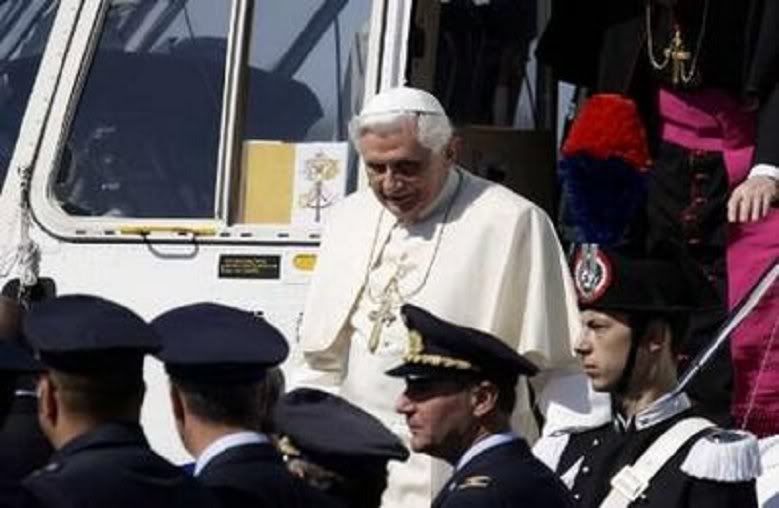
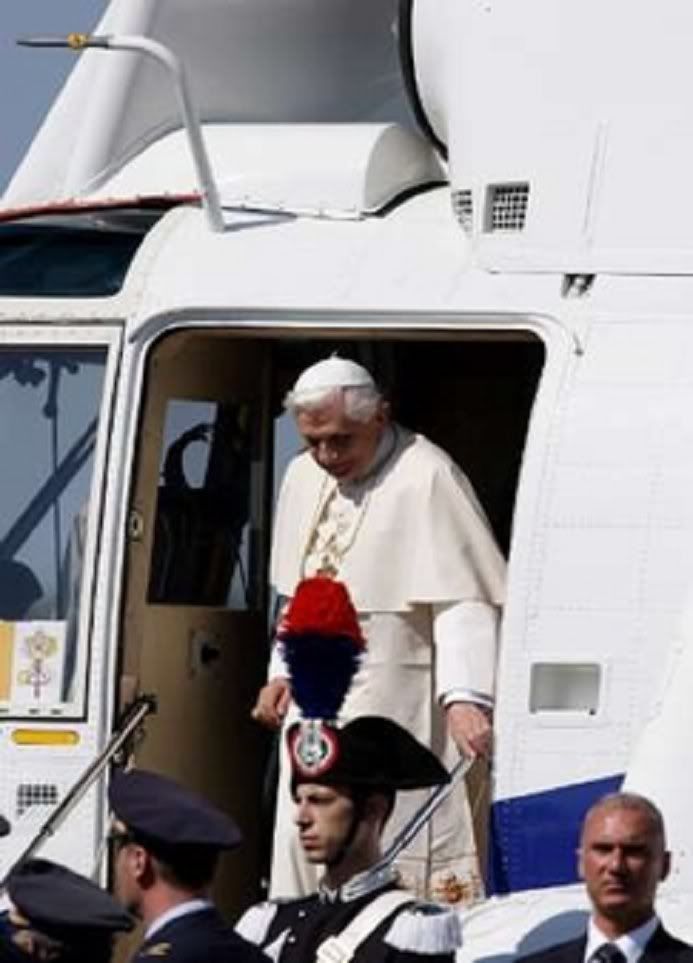
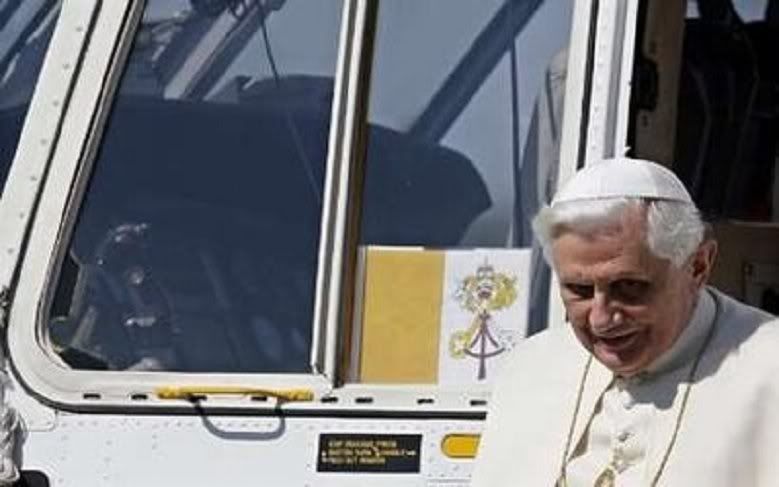 Pope leaves for Australia
Pope leaves for Australia
to attend World Youth Day

ROME, July 12 (AFP) - Pope Benedict XVI left Rome on Saturday for Australia, where he will meet hundreds of thousands of young people celebrating the Catholic Church's World Youth Day.
The plane took off from Rome's Fiumicino airport at 10:30 am (0830 GMT).
The trip will be Benedict's longest since becoming pope three years ago, and the 81-year-old pontiff will rest for three days at a retreat centre near Sydney ahead of the six-day event celebrating the Catholic faith aimed at young people.
His first public appearance will be at the head of a Sydney Harbour flotilla on July 17 and the trip will culminate in an open-air mass at Sydney's Randwick Racecourse expected to attract hundreds of thousands of pilgrims on July 20.
Pope Benedict leaves
for pilgrimage to Australia

ROME, jULY 12 (ap) - Pope Benedict XVI has left Rome on a flight to Australia for a 10-day pilgrimage.
A special Alitalia flight with Benedict, Vatican officials and journalists aboard departed from Rome's Leonardo da Vinci airport Saturday about 10:30 a.m.
The 20-hour flight and the public events during the pilgrimage to Sydney will test the elderly pope's stamina.
The trip is the longest of Benedict's three-year-old papacy.
His journey centers around the Catholic Church's World Youth Day events, which include a vigil service with a crowd of young people and an outdoor Mass. Benedict returns to Italy on July 21.
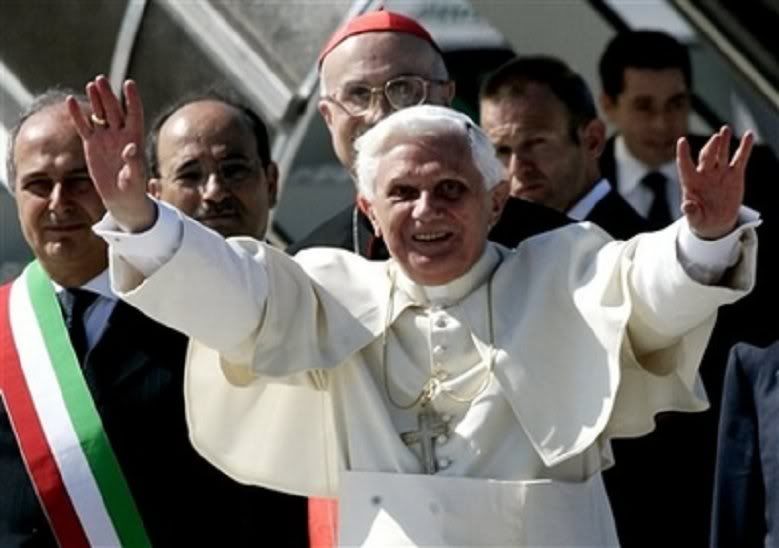
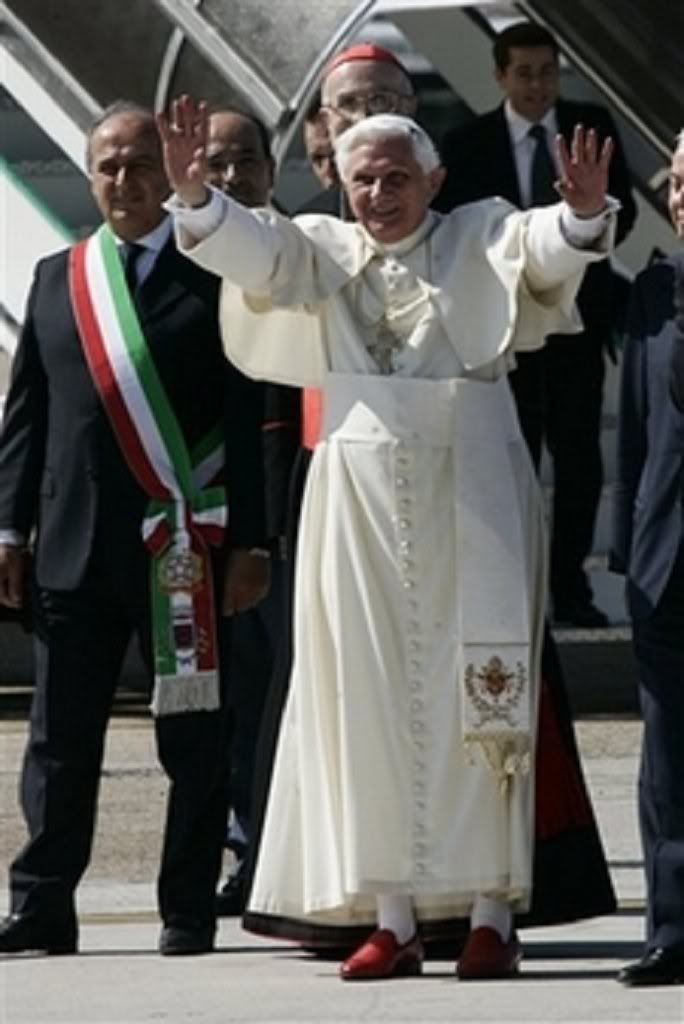
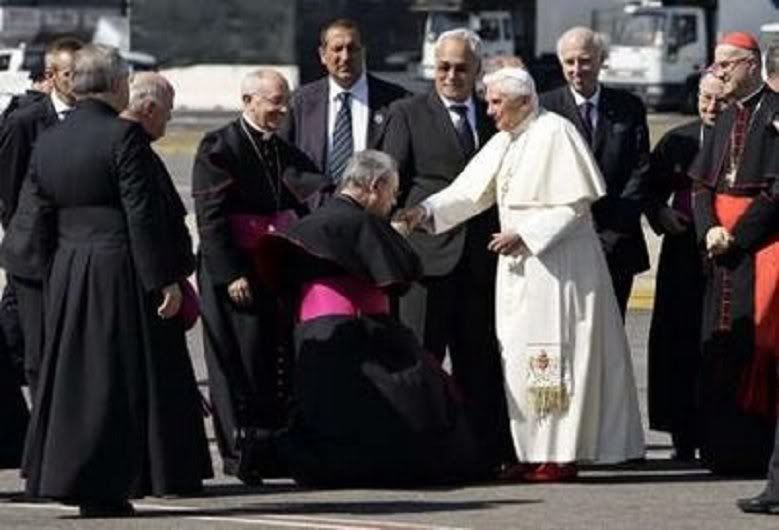
[Modificato da TERESA BENEDETTA 12/07/2008 14:12] |
 12/07/2008 13:23 12/07/2008 13:23 |
|
| | | OFFLINE | | Post: 64 | Registrato il: 16/07/2007
| Utente Junior | |
|
Teresa, with respect to the Pope's possible visit to Germany you wrote: "At the same time, he has also been blunt in describing Protestant denominations as “not proper churches.” In fact, he doesn’t refer to them as churches at all, but “ecclesial communities.” [I believe these statements are inaccurate. The CDF has made the distinction - but not, I think, Pope Benedict personally - that some Christian denominations which broke off from the Church during the EEformation cannot be considered as 'Churches' in the strict Catholic definition that sees the Roman Catholic Church as the 'only Church of Christ'. But Catholic hierarchy, including Pope Benedict, have continued to use the term 'church' in everyday speech for the Reformed Protestant churches. I made a point to notice how the Pope would refer to them in his JuNE 28-29 homily and address.]"
You are wrong. The 2007 Response from the CDF simply repeated language from Dominus Iesus, which was issued from the CDF while Joseph Ratzinger was prefect and carried his signature. While the Pope may use the term "church" in some speeches, it has been clear since 1992 [Dominus Iesus] that he does not regard the Reformation communities as churches in the proper sense. Moreover, the CDF would not issue a document that was at odds with the Pope's own thinking and which did not carry his approval. Cf. the article you posted on the new Secretary of the CDF, where it says that Benedict is returning to an older form of governance, wherein he is the de facto head of the CDF.
|
 12/07/2008 13:42 12/07/2008 13:42 |
|
| | | OFFLINE | | Post: 14.291 | Registrato il: 28/08/2005
| Utente Gold | |
|
   For the latest videonews on the Holy Father
www.radiovaticana.org/it1/videonews_ita.asp
For the latest videonews on the Holy Father
www.radiovaticana.org/it1/videonews_ita.asp
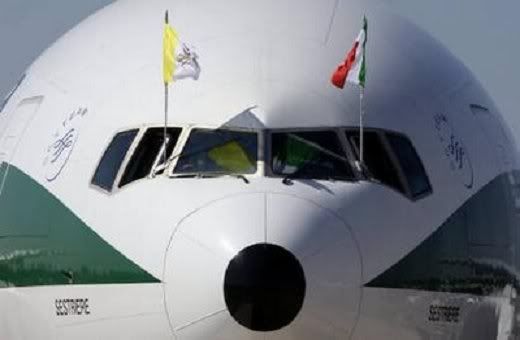 Pope expresses worry
Pope expresses worry
about climate change

ABOARD THE PAPAL PLANE, July 12 (AP)- Benedict XVI says he wants to wake up consciences on climate change.
The Pope told reporters while flying to Australia Saturday on a 10-day pilgrimage that people need to be spurred into finding a way to change life styles in the face of climate change.
Benedict also said he would use his trip to Australia to work for "healing" with victims of sexual abuse by clergy, just as he did during a trip to the United States this year.
Benedict called such abuse "incompatible" with behavior required of priests.
Benedict said the Church in the West "in crisis" but that it wasn't in decline. He said was optimistic about its future.
More on the Pope's
inflight interview
Translated from
 online
July 12, 2008
Benedict XVI is flying to Australia where Sydney is ready to welcome here for the 23rd World Youth Day.
Once more, on an inflight news conference after take-off, he took the occasion to speak about priests who commit sexual offenses.
"To be a priest is incompatible with sexual abuses, with any behavior that contradicts holiness," the Pope replied when he was asked if he intended to make an apology for clergy offenses in this respect when he gets to Australia as he did in the United States.
The Pope replied that he "spoke about sex abuses because the issue was so central in the United States" and that "it would be the same for Australia."
Asked about the outcome of the recent G8 summit in Japan with regard to environmental responsibility, the Pope called on politicians and specialists to 'respond to the great ecological challenge' to the degree that they are capable of.
The Pontiff observed that the question of the environment would be 'very actual' even in Sydney "because the Holy Spirit is creation, and we have a responsibility to God's creation."
"I don't claim to intervene in technical and political issues but the Church should provide the essential impulses so that policies can respond to this great challenge."
"We should rediscover our resposibility in this respect and find the ethical capacity for a lifestyle change that is necessary if we really wish to make positive solutions. We should awaken consciences to see the broad context, but the actual answeres should be found by the politicians and the experts."
The Anglophone news agencies filed their stories later. But here is the kind of thoughtless headline that gives journalism such a bad name - and is rank disservice to the hapless readers as well as the 'victim' of the journalistic offense:
Pope will apologise
for Church's sexual abuse
in Australia
 How can sexual abuse be attributed to the 'Church'? No deskman with a modicum of common sense would or could commit such a flagrant error!
How can sexual abuse be attributed to the 'Church'? No deskman with a modicum of common sense would or could commit such a flagrant error!
ABOARD THE POPE'S PLANE (AFP) - Pope Benedict XVI said Saturday he will use his visit to Australia to apologise for sexual abuse by priests and to examine how the Church can "prevent, heal and reconcile".
"We have to consider what was insufficient in our behaviour and how we can prevent, heal, reconcile," Benedict told reporters aboard his plane as he headed to Australia to lead the Catholic Church's World Youth Day celebrations.
"This is the essential content of what we will say as we apologise," the Pontiff said.
Benedict added that the function of being a priest was incompatible with sexual abuse.
The World Youth Day celebrations have already been partly overshadowed by the launch on Friday of an investigation into sexual abuse allegations against a disgraced Australian priest and embroiled the leader of the Catholic Church in Australia in allegations of a cover up.
The primate, Sydney Archbishop Cardinal George Pell ordered an independent, Church-appointed panel to investigate the claims.
The investigation centres on allegations from former religious education teacher Anthony Jones that a priest sexually abused him in 1982 after a swimming session.
In a 2003 letter, obtained by the Australian Broadcasting Corporation, Pell told Jones an internal report did not support his accusation of attempted aggravated sexual assault by the priest, Father Terence Goodall.
But the internal report had in fact accepted all Jones's allegations.
World Youth Day is a celebration of Catholic youth that will culminate in Sydney with a Mass by the Pontiff on July 20 expected to draw some 500,000 people.
Pope to apologize for sex abuse
in Australia
By Philip Pullella

ABOARD THE PAPAL PLANE, July 12 (Reuters) - Pope Benedict said on Saturday he will apologize for a sexual abuse scandal that has rocked the Catholic Church in Australia, saying pedophilia was "incompatible" with being a priest.
Speaking at a news conference on the plane taking him to Australia, the Pope said he would make similar comments to those during a trip to the United States last April. Then, he made apology for sexual abuse a major part of his visit, meeting victims and vowing to keep pedophiles out of the priesthood.
"It is essential for the Church to reconcile, to prevent, to help and to see guilt in this problem," he said on Saturday.
"It must be clear ... that being a real priest is incompatible with this (sexual abuse) because priests are in the service of our Lord."
Victims of sexual abuse by Catholic priests and brothers in Australia have been calling on Benedict to apologize when he arrives in Sydney on Sunday for World Youth Day.
Broken Rites, which represents abuse victims in Australia, has a list of 107 convictions for church abuse, but says the real number of cases is far greater as only a few go to court.
Victims of abuse by clergy plan to protest during the Pope's visit. A group called "No Pope" will meanwhile hand out condoms in protest at church doctrine and protest extra police powers during the papal visit that it says crush civil liberties.
Only days before the Pope's arrival, a 25-year-old sexual abuse case involving a Sydney priest was reopened after Cardinal George Pell, the head of the Catholic church in Australia, denied he tried to cover up the abuse.
Pell denied he misled Anthony Jones, who complained of abuse by a priest, when he wrote Jones a letter in 2003 rejecting his claim because there were no other complaints against the priest.
Pell wrote to another man on the same day upholding his abuse claim against the same priest. The priest was stood down and in 2005 convicted of indecently assaulting Jones in 1982.
On Friday, Pell reopened the case, referring it to an independent review panel.
Organizers of World Youth Day expect hundreds of thousands of young pilgrims for the event, with Pope Benedict conducting several religious events culminating in a final open-air Mass at Sydney's main horse racing track.
And here's a report from the Italian service of AP that should have been in the Reuters story (Reuters is a British/Commonwealth news agency)!
Pope comments on
Anglican crisis

ROME, July 12 (Translated from Apcom) - The Pope says he prays that there will be no further fractures in the Anglican Communion after recent disputes.
Benedict XVI was asked about the Anglican crisis during his inflight interview enroute to Sydney for World Youth Day celebrations.
He made clear that he did not wish to appear to be meddling in the disputes now embroiling the Anglican leadership, in which a group of traditionalist bishops threatenen to break away in protest widespread liberalization of ecclesiastical practices throughout the Anglican world. [More to the point, some of these bishops are seeking the Pope's help in facilitating a mass conversion to Catholicism by themselves and their Church followers.]
Despite that, the Anglican hierarchy voted last week to allow the ordination of women bishops. At the end of July, the decennial conference of the Anglican Communion will take place. Besides the issue of women bishops, the leaders will also take a stand on gay ministers and homosexual unions within the church.
[Modificato da TERESA BENEDETTA 12/07/2008 19:02] |
 12/07/2008 13:59 12/07/2008 13:59 |
|
| | | OFFLINE | | Post: 14.292 | Registrato il: 28/08/2005
| Utente Gold | |
|
While I always welcome it if my mistakes are pointed out so that I may correct them, I believe my comment was clear that Benedict XVI himself has not personally - and the rest of the Vatican hierarchy that I am aware of - made the formal distinction about churches in his/their own spoken utterances, and that I paid particular attention on June 28-29 to how he would refer to other 'churches', and this is what he said, at the Basilica of St. Paul on June 28:
I greet the fraternal delegates of the Churches who have a particular bond to the Apostle Paul - Jerusalem, Antioch, Cyprus, Greece - which make up the geographical setting of the Apostle's life before he came to Rome.
I cordially greet our brothers from different churches and ecclesial communities of the East and West, together with all of you who have wanted to take part in this solemn beginning of the year dedicated to the Apostle of the Gentiles.
Of course, one can always split hairs and point out that the way he phrased it could well be parsed to show he meant 'churches' to refer to the Orthodox churches (East) and ecclesial communities to refer to the Protestant denominations (West), but that's stretching a point - and he's still using 'churches' in the plural. What seems obvious to me is that in his spoken utterances, he does not split hairs - least of all, at an ecumenical service - and make the formal distinction which, after all properly belongs to a dogmatic statement, not to an ecumenical homily.
And yes, I am aware that Dominus Iesus carried his signature, but that has nothing to do with the comment I made about his spoken words - at least, those that I am aware of. And of course, that he chooses to be 'diplomatic' - 'colloquial' is probably the more appropriate term - in speech does not mean he is thereby repudiating dogma.
[Modificato da TERESA BENEDETTA 12/07/2008 17:33] |
 12/07/2008 18:14 12/07/2008 18:14 |
|
| | | OFFLINE | Post: 36 | Registrato il: 28/05/2007
| Utente Junior | |
|
A Papal visit to Thüringen!!?? OMG - that would be a dream!! The Wartburg is only approx. 30 min. by car! Across the State border to Thuringia and there you are!!!
Hmm.. too good to be true, I think!
|
 12/07/2008 18:23 12/07/2008 18:23 |
|
| | | OFFLINE | Post: 3.173 | Registrato il: 23/11/2005
| Utente Master | |
|
Too Good to be True?
Cowgirl, I'll bet he does it. I'll bet he goes to Berlin and also to Thuringia. Things seem to have been moving that way for a while now. Better go buy some comfortable shoes and a good knapsack now before the rush.
|
 12/07/2008 19:00 12/07/2008 19:00 |
|
| | | OFFLINE | | Post: 14.294 | Registrato il: 28/08/2005
| Utente Gold | |
|
   Benedict XVI looks forward
Benedict XVI looks forward
to 'a great feast of faith'
Translated from the
Italian service of
 
"It is a great feast of faith (which) opens new frontiers in uniting different cultures".
While still flying over Europe, headed for the farthest destination of his nine apostolic journeys abroad so far, Benedict XVI thus described World Youth Day, whose main celebrations he will preside over next week.
In the past few days, tens of thousands of young pilgrims have 'taken possession' of Sydney for the occasion.
Speaking to journalists on the Alitalia Boeing 777 which left Rome's Da Vinci airport at 10:30 Saturday morning, Benedict XVI was asked about some current global concerns, such as protection and sharing of the world's resources, or topics previously addressed, such as the scandal over priests who have committed sexual offenses.
Here ar esome excerpts of what the Pope said:
I am going to Australia with great joy. I have the most beautiful memories of World Youth Day in Cologne. It wasn't just an event for the masses: it was above all a great feast of faith, a human encounter in communion with Christ. We saw how faith can open frontiers and has a true capacity to unite different cultures and to create joy.
I hope the same thing will happen in Australia. I am always very happy to see so many young people together, and to see them all united in the desire for God and for a world that is genuinely human.
The basic message is in the words that make up the theme of this WYD. We shall be speaking about the Holy Spirit who makes us his witnesses. So I wish to concentrate my message on the reality of the Holy Spirit who manifests in different dimensions and is the creative Spirit of all Creation.
The trip - which will be almost 20 hours long, over a distance of more than 16,000 miles - began with the traditional exchange of greetings between the departing Pope and the Italian President, later followed by courtesy greetings from the Pope to the heads of state of each of the countries that he will be flying over.
In his message to Italian President Giorgio Napolitano, the Pope said he was going "to meet the youth of the world to exhort them to be courageous witnesses of Christ's love in the face of the expectations and hopes of men today, particularly their contemporaries."
In his telegram to the Pope, the President said, "Beyond the supreme spiritual significance of World Youth Day, it is an occasion for young people from around the world to encounter and enrich each other through the dialog between diverse cultures and traditions, while recognizing the common matrix of the human family."
This is a confrontation that has already been taking place in Sydney, as Roberto Piermarini, our correspondent in the Australian capital, reports:
The Cross and the Marian icon - symbols of World Youth Day - have marked the road for the young pilgrims who have been arriving in ever greater numbers in Sydney from all over the world.
The Cross and the Icon, along with the 'message stick' - an aboriginal wooden rod engraved with words of welcome in their language - will enter the ex-harbour of Barangaroo for the Opening Mass of the 23rd World Youth Day.
These symbols have visited 400 communities all over Australia and been carried by some 400,000 persons over the past year. In some cities, the WYD symbols were even taken to people in prison.
Amidst the skyscrapers of Melbourne, the welcome for the symbols was surprising, with tens of thousands - Christians and non-believers alike - turning out to welcome them.
In Echuca, home to thousands of Aborigines, the symbols were welcomed by a group of dancers; and they were taken to the Great Barrier Reef in the vicinity of Cairns by a Navy destroyer to show that the Christian message knows no boundaries.
In the past few weeks, 2500 volunteers from Catholic schools in Sydney have been preparing the knapsacks given to registered pilgrims for WYD, packing each knapsack with reading material, pens, a scarf, a 'pilgrim's passport' which will guarantee discounts for shopping and many services, a rosary, a raincoat, a flashlight and a thermal blanket. No condoms, as some hostile local papers, have reported!
The 225,000 registered pilgrims represent 170 countries, but the largest contingents, after the host Australians, are from the United States, Italy, the Philippines, New Zealand, France, Canada and Poland.
There would have been more if airlines worldwide had not raised fares in the past several months. Many of the visiting pilgrims are being hosted by families in the Sydney area.
Other Christian churches, as well as the Jewish and Muslim communities in Sydney, are also hosting some of the visitors. For example, the Islamic Center of Sydney is housing 220 young people from Argentina.
The Neo-Catechumenal Way is sending 25,000 representatives who, before coming to Sydney, first visited the other major Australian cities to spread the Word.
The papal flight will make a refuelling stop at a military base in Darwin, capital of North Australia, after flying more than 15 hours non-stop from Rome. The final four-hour flight to Sydney will land at another Royal Australian Air Force base outside the capital.
From there, the Pope will be driven to Kenthurst Study Center, located in the countryside 40 kilometers from Sydney, where he will spend three days adjusting to the drastic change in diurnal biorhythm after going through eight time zones.
But what face will Australia show Benedict XVI, who becomes the third Pope to visit this remote continent after Paul VI and John Paul II (who was there twice)? Once again, Roberto Piermarini, with this report:
Australia, the 'isola felix' (happy island), the island continent as large as all of Europe, is a country not only of wide open spaces but also of strong contrasts.
This continent, in which Nature is so abundantly vivid, is home to one of the richest societies on earth, with a median per capita income of 700 euros a week and a gross domestic product which, notwithstanding the worldwide financial crisis, has been growing at 3% a year, with an unemployment rate of only 4%.
However, the government of Australia also has to 'settle accounts' with the aborigines to whom, last February, the new Prime Minister, Kevin Rudd, formally offered apologies for the sufferings and humiliation caused to them by the policy of 'assimilation' carried out by the government between 1910-1970.
When Captain James Cook first set foot in Australia in 1770, there were at least a million indigenous inhabitants - today they are less than 500,000 with a life expectancy that is 17 years less than the average Australian, according to Jackie Huggins, director of the Center for Aboriginal Studies at the State University of Queensland.
Additionally, however, another study center, Relationship Australia, points out that a 'creeping disease' has been eating at the fabric of society, in the decline of the family: In the past 10 years, not only have separations and divorces been on the rise, but the number of childless couples has increased by 30%, and only 49% of adults are married.
Two years ago, the federal government launched a 'baby bonus' to encourage more children, but the annual population growth has not gone beyond 1.4%.
Another alarming figure: more than four and a half million Australians above age 20 are 'single' (total estimated population in 2008 - 21,350,000).
The National Youth Commission also says that some 22,000 young people aged 12-18 are homeless, twice that of five years ago.
The number of minors addicted to alcohol has tripled, and teenage users of 'ecstasy' number more than half a million. Five percent of 15-year-olds smoke marijuana. Recruitment to the Armed Forces has been affected seriously by the drug problem.
Thus, the relevance of Benedict XVI's message for the 23rd World Youth Day released a year ago, when he asked the youth of the world to come together in Sydney - physically and in spirit - to "announce the beauty and joy of the Gospel to a society that has been too secularized in many aspects. Australia must rediscover its Christian roots."
* * * * * * * * * * * * * * * * * * * * * * * * * * * * * * * * * * * * * * * * * * * * * * * * * * * * * * * *
As usual during a papal trip abroad, all reporting about the Pope's trip to Sydney will now be done on the Sydney thread.
|
 15/07/2008 01:39 15/07/2008 01:39 |
|
| | | OFFLINE | Post: 3.184 | Registrato il: 23/11/2005
| Utente Master | |
|
How the pope is saving Earth
Benedict's Hungarian forest plan will cut emissions and power Vatican City.
By Glenn Hurowitz
The Los Angeles Times
July 14, 2008
Pope Benedict XVI, like many world leaders, has spoken passionately about the urgent need to protect the planet from climate catastrophe. But unlike his fellow heads of state, the pontiff has actually created a carbon-neutral economy -- and done it cheaply and quickly.
The Vatican announced last year that it would restore 37 acres of forest in Hungary that had been cut down in the Middle Ages. Those growing trees will absorb enough carbon dioxide to offset all the pollution from the fossil fuels used to power Vatican City.
The reason this "Vatican model" succeeded while other countries struggle to achieve even modest emissions reductions is because of the unique qualities of forest conservation and restoration. Compared with other methods of reducing climate-changing pollution, such as switching to wind, solar or geothermal power, it's fast and relatively cheap. That's true on a small, Vatican City scale as well as a massive American scale.
It's particularly true when it comes to the carbon-rich tropical forests that act as the Earth's lungs, breathing in carbon dioxide and breathing out oxygen. These forests are being logged and burned at a terrifying pace by big agricultural, biofuels and mining companies. Between August 2007 and April 2008, for instance, big ag and its cohorts destroyed a whopping 2,300 square miles of the Amazon, releasing 300 million tons of CO2 into the air in the process. Compounding that disaster, the treeless land generally loses its capacity to absorb the greenhouse gases produced by the world's fossil fuel consumption.
The good news is that stopping that destruction -- by purchasing the land outright or paying landowners and others to conserve it -- is a bargain. Because of the low cost of tropical land, protecting these forests can cost as little as $1 per ton of CO2 saved and almost never more than $10 a ton. (For comparison, cleanups based primarily on energy now trade for more than $40 a ton on European markets.)
As a result, the World Bank and others estimate that global deforestation could be completely halted for the relatively tiny sum of $11 billion to $15 billion a year. That one move alone would eliminate 20% of total global warming pollution.
Despite the urgency of the problem -- and the ease of the solution -- forest conservation has, until recently, been the forgotten stepchild of climate legislation. For many years, policymakers (particularly in Europe) were nervous that polluters would abuse the system by using low-cost overseas forest conservation projects as an excuse to avoid cleaning up industrial pollution at home.
But forest conservation needn't be an end. It should be a beginning. Again, we can look to the Vatican as a model. The pope didn't stop with his Hungarian forest. This year, he's planning to unveil an array of solar panels atop the huge Paul VI Audience Hall, which will provide enough electricity to light, heat and cool the building year-round. The pontiff is using forest conservation the right way: not as a method to avoid a clean-energy revolution but as a way to achieve immediate gains while other progress is underway, including the greening of Catholic Church operations around the world.
That should be the model for the United States (and other industrialized nations too). Although comprehensive climate change legislation is considered dead for this year, it's likely that Congress and President Bush could cobble together a consensus to authorize the $11 billion necessary to halt worldwide deforestation for 2009. That would keep 6 billion tons of carbon dioxide out of the atmosphere -- equivalent to the United States' entire annual emissions -- and save 30 million acres of forest from destruction for the foreseeable future. It would send a clear signal to American voters (and the world) that although the details still have to be figured out, the federal government can deliver real action on climate change.
This isn't as pie-in-the-sky as it might seem. Bush already has approved several significant tropical forest conservation projects in Guatemala, Costa Rica, Panama and elsewhere. With this deal, Bush could legitimately claim that he'd done far more, far sooner, for far less money to stop global warming than either the Kyoto Protocol or the failed congressional climate bill would have.
By following the pope's example, even Bush might qualify for a bit of eco-sainthood.
|
 15/07/2008 13:02 15/07/2008 13:02 |
|
| | | OFFLINE | | Post: 14.326 | Registrato il: 28/08/2005
| Utente Gold | |
|
VATICAN FOCUSES ATTENTION ON
WATER RESOURCES & SUSTAINABLE DEVELOPMENT
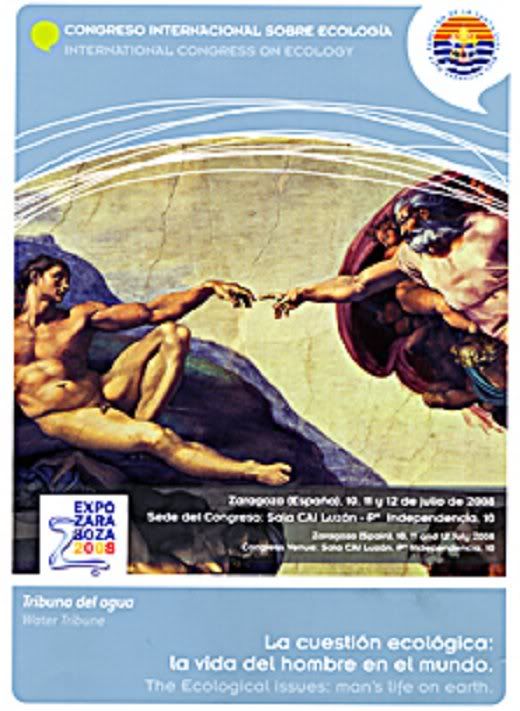
The Vatican today released the Holy Father's message designating Cardinal Raffaele Martino as his persional representative to 'Vatican Day' at the current Expo Zaragoza in Spain.
The Holy See pavilion at the universal exposition is dedicated to the theme 'Water and sustainable development', tackled by an International Congress on Ecology held as part of the Exposition program.
[ I will post a translation of the Spanish text as soon as I can.]
[Modificato da TERESA BENEDETTA 15/07/2008 13:04] |
 16/07/2008 00:04 16/07/2008 00:04 |
|
| | | OFFLINE | | Post: 14.335 | Registrato il: 28/08/2005
| Utente Gold | |
|
  www.radiovaticana.org/it1/videonews_ita.asp
For the latest videonews on the Holy Father
It's not clear from the words "the Holy See reported" exactly where this item originated from, since both the Holy Father and Cardinal Bertone are in Australia, and it seems strange for anyone in the Vatican to make such an announcement on their own.
Iraqi Premier to visit Benedict XVI
www.radiovaticana.org/it1/videonews_ita.asp
For the latest videonews on the Holy Father
It's not clear from the words "the Holy See reported" exactly where this item originated from, since both the Holy Father and Cardinal Bertone are in Australia, and it seems strange for anyone in the Vatican to make such an announcement on their own.
Iraqi Premier to visit Benedict XVI
VATICAN CITY, JULY 15, 2008 (Zenit.org).- When Benedict XVI returns from Australia, he will be visited in Castel Gandolfo by the prime minister of Iraq.
Nouri al-Maliki will visit the Pope on July 25, the Holy See reported.
Cardinal Tarcisio Bertone, the Holy Father's secretary of state, will also meet with the Iraqi leader.
Al-Maliki has been the prime minister in Iraq since 2006. He has repeatedly condemned violence against the Christian minority of his country as an attack on all Iraqis.
|
 17/07/2008 02:21 17/07/2008 02:21 |
|
| | | OFFLINE | Post: 3.185 | Registrato il: 23/11/2005
| Utente Master | |
|
The insinuations here really stink.
Benedict keeps to West in travel
By VICTOR L. SIMPSON
July 16, 2008
SYDNEY, Australia (AP) — While he didn't expect to travel much, Pope Benedict XVI is actually keeping pace with his globe-trotting predecessor John Paul II. The difference is their destinations.
John Paul, only 58 when he assumed the papacy, made extensive tours of the developing world, with stops in Catholic strongholds and some of the world's poorest countries among his first nine pilgrimages. Benedict, now 81, has stayed mainly in the affluent West.
With the exception of Brazil and a trip to Islamic Turkey, Benedict's itinerary reads much like the list released by the Vatican last week of the countries whose Catholics and dioceses contribute the most to the Holy See: the United States, Germany, Spain, Italy, Austria.
Benedict is marking the Church's World Youth Day in this splendid city of First World opulence and is expected to announce that the next global youth event will be in Madrid, Spain.
The German-born pope has made no secret of his interest in Catholicism in the West, particularly Europe, where Mass attendance is very low and many churches are empty. On the plane taking him from Rome to Sydney, Benedict said the church in the West was in "crisis" because people believe they no longer need God.
He clearly has not made the developing world a travel priority — Benedict's next scheduled trip is to France in September — but there are those who think he should.
In an interview with the Italian Catholic newspaper Avvenire before the pope left Rome, Cardinal Oscar Andres Rodriguez Maradiaga of Honduras stressed the importance of papal travel.
"Only the rich can afford to come to Rome," he said. "So I say, only slightly joking, that papal trips are a kind of preferential option for the poor."
But the Rev. Hugo Valdemar, spokesman for Mexican Cardinal Norberto Rivera, said the pope's travel choices were understandable.
"The pope's agenda doesn't take into account if a country is rich or the number of Catholics in each country," Valdemar told The Associated Press. In Australia, "he is attending an international ecclesiastical event and to this moment we haven't had an event of such magnitude in Mexico."
Benedict's health — and the toll on it that long journeys and heavy schedules could take — must be considered.
"It's not that the pope doesn't love Mexico as much as Pope John Paul II, but the truth is that he will be 82 years old next year and the Vatican takes good care of his health," Valdemar said.
"He has told Mexican Cardinal Norberto Rivera he wants to visit Mexico. We have invited him to come to the World Family Day in January and we're planning the events as if he were attending."
The more than 20-hour flight Benedict made to Australia is the longest of his papacy, which was three years old in May, and aides made sure he had plenty of time to recover from the flight by scheduling three days of rest before he joins youth festival events on Thursday.
After Australia, the only confirmed trip is to France, with stops in Paris and the shrine in Lourdes. President Joseph Kabila of Congo, where the Catholic Church is an influential voice, recently invited Benedict during a visit to the Vatican. But there has been no confirmation that Benedict agreed to go.
World Youth Day is pretty much a festival of young people from affluent countries. The United States — with 15,500 attending — has the biggest representation from outside Australia, followed by Italy with 10,000 and Germany with 6,000, according to a list from organizers Wednesday.
There are exceptions. The Philippines, the Catholic bastion of south Asia and relatively close to Australia, has 2,500 young people registered. There are also small groups from developing countries sponsored by Catholic agencies and other groups.
Two years of car washes, can and bottle drives and other fundraisers finally gave 16-year-old Cassandra Jimenez the $3,500 she needed to make the pilgrimage to Sydney with her diocese from Oregon. It was an exhausting process, but attending the festival was an incredible reward, she said as she tucked into a plate of food at her first Aussie barbecue on Wednesday.
Fellow parishioner Jacob Lochner agreed the effort was worth it.
"Every penny and then some," the 16-year-old said with a grin.
=====================================================================
I share your instant distaste, Benefan! As I was working completely within the Sydney thread last night, I also posted the same article there - with 'extensive' commentary, as you can imagine, of Mr. Simpson's far from factual insinuations as even the most superficial examination of the trips undertaken by Benedict XVI would show.
Teresa
[Modificato da TERESA BENEDETTA 17/07/2008 13:44] |
 17/07/2008 02:26 17/07/2008 02:26 |
|
| | | OFFLINE | Post: 3.186 | Registrato il: 23/11/2005
| Utente Master | |
|
Benedict is encouraging Anglican converts
Damian Thompson
Daily Telegraph
Wednesday, July 16, 2008, 02:52 AM GMT [General]
More evidence this morning that Catholic liberals are panicking at the prospect of an influx of conservative Anglicans. They want us to believe that Pope Benedict is "shunning defectors" in an attempt to shore up the position of the Archbishop of Canterbury. Not true.
On his way to Australia, the Pope was asked about the Lambeth Conference. He replied that the Catholic Church should not intervene in its deliberations and that he was praying that there would be no more schisms and fractures. Lambeth Palace and its liberal Catholic allies have now spun this into a papal message of support for Rowan Williams in his attempts to persuade Anglicans not to convert to Rome.
Liberals claim that Pope Benedict has "let it be known that he does not support the defection of conservative Anglicans to the Roman Catholic Church". He has done no such thing.
The Pope is supporting moves by the Congregation for the Doctrine of the Faith to construct a model whereby a group of rebel conservative Anglicans, the Traditional Anglican Communion, can be received en masse and occupy their own structures inside the Roman Catholic Church. This model – which is being constructed in secret – could serve as a blueprint for mainstream Anglicans wanting to convert as a group.
To understand what is going on, it is important to grasp that Cardinal Walter Kasper, the Vatican's head of ecumenism who is attending Lambeth, is not a close adviser to the Pope. He and the former Cardinal Joseph Ratzinger have even clashed publicly in the past. Likewise, Cardinal Cormac Murphy-O'Connor, who is also attending Lambeth, is not close to the Holy Father.
Always remember: it was Cardinal Ratzinger who sent a personal message of support to conservative Anglicans meeting in Dallas in 2003, thereby horrifying Kasper – who, as a professional ecumenist, probably is unsympathetic to Anglo-Catholics rocking the boat. But he, thank God, is soon to retire.
I'm intrigued by the role played by the liberal Catholic magazine the Tablet in spinning this Pope-spurns-defectors story. Benedict is an old adversary of the Tablet, which spent many years blackening his name. Recently, Rome asked the English bishops to explain why they never distance themselves from the publication, which this year carried an article advocating lay celebration of the Eucharist.
The Tablet adores Rowan Williams and despises Anglo-Catholic opponents of women priests. Small wonder, then, that it is attempting to shore up Cantuar's position by misrepresenting Benedict, with (I fear) the tacit support of some members of the English hierarchy.
I just hope that Anglo-Catholics will not be taken in. Let's put this bluntly. Far from wanting to preserve the Anglican Communion, Pope Benedict wishes all its members to become Catholics. He realises, however, that corporate reunion is now impossible, and so he and his key advisers in the Congregation for the Doctrine of the Faith are considering ways in which groups of Anglicans can be received into full communion with the Holy See.
|
 17/07/2008 14:51 17/07/2008 14:51 |
|
| | | OFFLINE | | Post: 65 | Registrato il: 16/07/2007
| Utente Junior | |
|
Damian Thompson is right on the money. The Pope wants CATHOLICS, not refugees from the Anglican Communion with one-issue problems (e.g., homosexuality, women priests). There's more to being Catholic than disagreement with Rowan Williams or the liberal Anglican bishops. It's another good sign that fuzzy ecumenism is dead. |
 17/07/2008 17:41 17/07/2008 17:41 |
|
| | | OFFLINE | | Post: 14.362 | Registrato il: 28/08/2005
| Utente Gold | |
|
Iraqi PM to meet
Benedict XVI on July 25
 Confirming an earlier report this week...
Confirming an earlier report this week...
BAGHDAD, July 18 (AFP) - Iraqi Prime Minister Nuri al-Maliki will begin his planned tour to Germany and Italy on Monday and will also meet Pope Benedict XVI, government spokesman Ali al-Dabbagh said on Thursday.
Maliki will hold talks with German Chancellor Angela Merkel on political, economic, and security issues that concern both their countries, Dabbagh said in a statement.
Maliki would also meet representatives of German companies who have shown interest in setting up business in Iraq, he said.
During his meetings with German officials, the issue of three Germans currently held captive by the rebels from the Kurdistan Workers' Party (PKK) is expected to be discussed.
Maliki will travel to Italy on July 24 and meet his counterpart Silvio Berlusconi, and the following day have an audience with the Pope, Dabbagh said.
|
 21/07/2008 19:59 21/07/2008 19:59 |
|
| | | OFFLINE | Post: 3.202 | Registrato il: 23/11/2005
| Utente Master | |
|
Pope rejects invitation by ‘apostate’ Strasbourg
Dominic Kennedy and Richard Owen in Rome
The Times Online
July 21, 2008
The Pope has rejected an invitation to address the European Parliament, amid Vatican alarm at what is seen as a drift towards militant secularism.
A letter from the Vatican said that he was declining the request to speak to MEPs owing to other commitments and his age, The Times has learnt. The rejection came soon after the Pope agreed to spend his 81st birthday visiting President Bush and as his tour of Australia was ending. The Parliament, which wanted the Pope to be principal Christian guest in its Year of Intercultural Dialogue, may resort to a less well-known Eastern Orthodox leader.
The Vatican has favoured the White House as a reward for Mr Bush’s acclamation of faith in God and help for antiabortion causes.
At a Mass held at a racecourse in Sydney yesterday the Pope, who has been celebrating Catholic World Youth Day, told 400,000 worshippers that in many societies, “side by side with material prosperity, a spiritual desert is spreading: an interior emptiness, a quiet sense of despair”.
The breakdown in confidence between the Pope and the European Parliament is a sensitive area and observers close to the dispute are unwilling to be identified publicly. One spoke of the church hierarchy’s “great disillusionment” with the European project. Its founding fathers, Konrad Adenauer and Robert Schuman, were deeply Catholic. However, a well-informed observer said that the EU “has become more and more secularist”.
John Paul II addressed the Strasbourg Parliament in 1988. Since then there have been several clashes between the Vatican and the EU, culminating in dismay over the removal of “God” from drafts of the EU constitution.
The Pope’s refusal is particularly hurtful as the Parliament’s president is Hans-Gert Pöttering, a German Catholic and Christian Democrat. After he was elected president last year, Mr Pöttering visited the Vatican to celebrate the 50th anniversary of the Treaty of Rome. “He had a private audience and gave an invitation to the Pope to address the Parliament,” a spokesman for the presidency said.
The Vatican initially acknowledged that the request was being looked at, but early this year its Secretary of State said that the Pope would be unable to come “at least for 2008”.
The European Parliament has been trying to get leaders of world faiths to join its intercultural year. The Grand Mufti of Syria has already attended, Britain’s Chief Rabbi will do so and the Dalai Lama has an open invitation.
“Clearly the Pope is over 80 so they have to be very careful about not exhausting him,” the presidency spokesman said. Yet the Pope has made arduous trips to America and Australia. Mr Bush is regarded by the Vatican as far more sympathetic to its priorities than Europe. When he withdrew $34 million from the UN family planning programme in 2002, claiming that some money went to abortions, the European Union made up the shortfall.
|
|
|
|
|